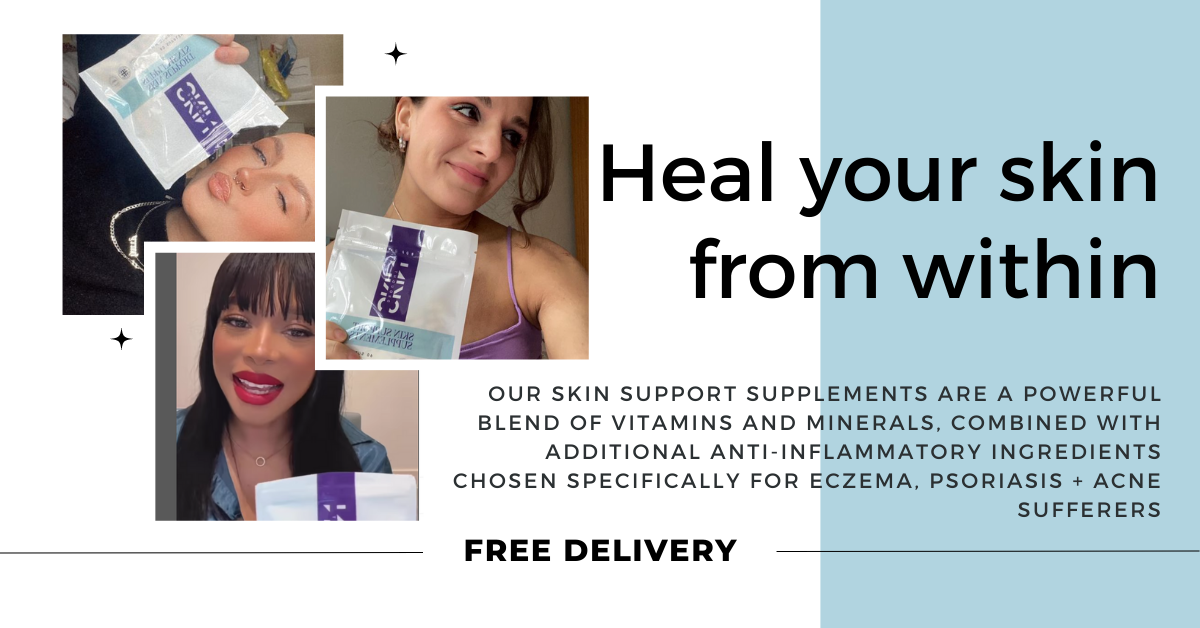A Guide to Safe Exfoliation for Eczema
Exfoliating can be a great way to improve the texture and appearance of your skin, but if you have eczema, it can be a bit more challenging. Exfoliation for eczema, if done incorrectly, can make your condition worse. However, with the right approach, you can safely exfoliate and improve your skin's health.
How Does Exfoliation for Eczema Help with Symptoms?
Exfoliation can help remove dead skin cells and unclog pores, which can reduce inflammation and itching associated with eczema. When dead skin cells build up on the skin's surface, it can lead to itchiness, inflammation, and further irritation. It can also help improve the absorption of moisturisers and other topical treatments.
By using a gentle exfoliant, such as a sugar or salt scrub, you can help slough off dead skin cells and promote healthier skin regeneration. It's important to note that not all exfoliants are suitable for those with eczema, as some can be too harsh and worsen the condition. It's always best to consult with a dermatologist before trying out any new skincare products.
In addition to removing dead skin cells, exfoliating can also help with product absorption. By removing the top layer of dead skin cells, your skincare products can penetrate deeper into the skin, allowing for better moisture retention. This can be especially helpful for those with eczema, as the condition often results in dry, flaky skin.
Choose the Right Exfoliating Products.
When you have eczema, it's important to choose the right exfoliating products to avoid further irritation. Look for gentle exfoliants that won't scratch or damage your skin, such as chemical exfoliants like alpha-hydroxy acids (AHAs) or beta-hydroxy acids (BHAs). We recommend Aveeno Face CALM+RESTORE® Gentle PHA Exfoliating Cleanser for a super gentle option. Many eczema sufferers benefit from avoiding physical exfoliants such as very grainy scrubs or rough brushes, which can be too harsh for sensitive skin. Go for a product designed for sensitive skin such as Aveeno Skin Renewal Gentle Body Scrub. Always patch-test new products before using them on larger areas of your skin to ensure they don't cause any adverse reactions. Don’t forget problem areas such as your scalp. We love The INKEY List 7% Glycolic Acid Exfoliating Scalp Scrub.
Be Gentle and Avoid Over-Exfoliating
When it comes to exfoliating with eczema, less is more. Over-exfoliating can damage your skin's natural barrier and lead to further irritation and inflammation. Stick to exfoliating once or twice a week, and avoid using any harsh or abrasive products. Instead, opt for gentle chemical exfoliants that can help to dissolve dead skin cells without causing any damage, such as Nip + Fab Glycolic Acid Fix Face Scrub with Salicylic Acid- AHA/BHA Exfoliating Facial Cleanser Polish. Always listen to your skin – if it feels sensitive or irritated, take a break from exfoliating until it has had a chance to heal. It's also important to avoid exfoliating areas that are already inflamed or broken.
Moisturise Immediately After Exfoliating
After exfoliating with eczema, it's important to moisturise your skin immediately. This will help to lock in moisture and prevent your skin from becoming dry and irritated. Look for a fragrance-free, hypoallergenic moisturiser that is specifically designed for sensitive skin. Apply it generously to your skin, paying extra attention to any areas that are particularly dry or prone to eczema flare-ups. Remember to continue moisturising regularly to keep your skin hydrated and healthy. We recommend Aveeno Skin Relief Moisturising Lotion.
How Often should you Exfoliate if you have Eczema?
It's important to listen to your skin and avoid over-exfoliating, which can cause further irritation. In general, if you have eczema, you should limit your exfoliation to once or twice a week at most. Over-exfoliating can irritate your skin and make your eczema worse, so it's important to listen to your body and adjust accordingly.
Consult with a Dermatologist
If you have eczema, it's important to consult with a dermatologist before exfoliating. They can help you determine the best exfoliation method for your skin type and condition, as well as recommend products that are safe and effective for eczema-prone skin. They may also suggest alternative treatments or therapies to help manage your eczema symptoms. Always follow their advice and guidance to ensure that you are exfoliating safely and effectively.
Disclaimer: This article contains affiliate links. We earn a very small commission from each purchase made through these links. There is no additional cost to you. All products featured have been specifically selected as products we personally use and love. For further information, please see our disclaimer page.



